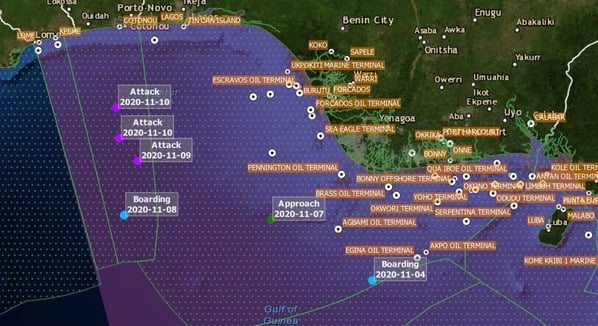
Photo Credit : Italian Navy, crew of Federico MARTINENGO - F 596
Operations
within the Gulf of Guinea are often conducted against the backdrop of
heightened risk. This is partly due to the prevalence of piracy in the
region, and the relative lack of both counter piracy resources and
activity. The recent flurry of incidents within the Gulf of Guinea
has increased the risk profile to a unique and exceptional level. The
risk profile for all maritime operations within the Gulf of Guinea at
this time is CRITICAL (incidents are highly likely, expected daily).
The sustained and elevated nature of the risk currently arises from several key factors.
In the past 5 days there have been 6 failed attacks against vessels
within two distinct areas: specifically, the waters south of Cotonou and
the Southern Niger Delta. In both instances, attacks have occurred
within the offshore domain at a distance of 60+nm. We've been tracking
the locations of the incidents via our online platform Atlas Inform,
which shows well-developed trends that strongly indicate an increase in
incidents occurring beyond the Niger Delta area, the traditional
heartland of piracy within the Gulf of Guinea. The incident timings and
locations indicate the presence of two separate attack groupings,
potentially originating from the same Pirate Action Group (PAG).
As
the rate of failed attacks increases, the perpetrators are highly
likely to increase in desperation. This is likely to be because of the
increased risk to themselves from Naval counter piracy activity, but
from logistical strain also;The
latter of which may be negated if a mothership is being used.
Heightened desperation also means that attempts against vessels are
highly likely to continue, further supported by a sustained period of
favourable weather. Smaller vessels and those of a vulnerable design are
increasingly prone to opportune targeting. Typically, vessels of this
nature, particularly fishing and offshore supply vessels are less
commonly targeted despite their opportunistic nature.
The
uniqueness of the risk profile currently stems exclusively from the
high rate of failed incidents and the sustained attempts by the pirates
to secure their objective, which is highly likely to be the kidnap and ransom of crew.
The relative constant threat of piracy within the Gulf of Guinea crates
a heightened risk profile for maritime operations, however it remains
rare for a sustained and clearly identifiable threat to exist. You can
explore previous incident reporting in the Gulf of Guinea via Atlas Inform which allows you to filter by incident e.g. kidnap, boardings, burglary etc. Book a demo by clicking the button below.
It is vital that the CRITICAL risk profile is however held in context. Since 2018, while the number of incidents within the Joint War Committee HRA
over the period from January to September have decreased by 4-10% each
year, the number of kidnapping incidents increased by 50% from 2018-2019
and by 16% from 2019-2020. The SW Monsoon period typically ends at the
beginning of September, improving the regional weather conditions in
favour of pirate activity. Since 2018, our data has shown that 25% of
2018’s and 35% of 2019’s total incidents occurred in this post-SW
monsoon period from September to December. In addition, incident numbers
from the beginning of September to November 11 this year are tracking
10% higher than the same period in 2019 and 37% higher than that of
2018.
It is vital that all vessels operate within this area at a heightened
posture maintaining the highest levels of vigilance whilst implementing
full hardening / mitigation in accordance with BMP West Africa where possible. You can download a copy of the BMP West Africa, by clicking the button below:
https://channel16.dryadglobal.com/critical-risk-gulf-of-guinea?utm_campaign=West%20Africa&utm_medium=email&_hsmi=99577715&_hsenc=p2ANqtz--U0myK_3JyJhkRr1vPNXlZPJnmYwWWi33Lv2EuFRWd-G8RvE3Ubx_va-DYkvoz9RfXxuQZGTAevyqihokA0GqJwbt3LTGhEtUjo2-PjDRHThgz-v4&utm_content=99577715&utm_source=hs_email

No comments:
Post a Comment